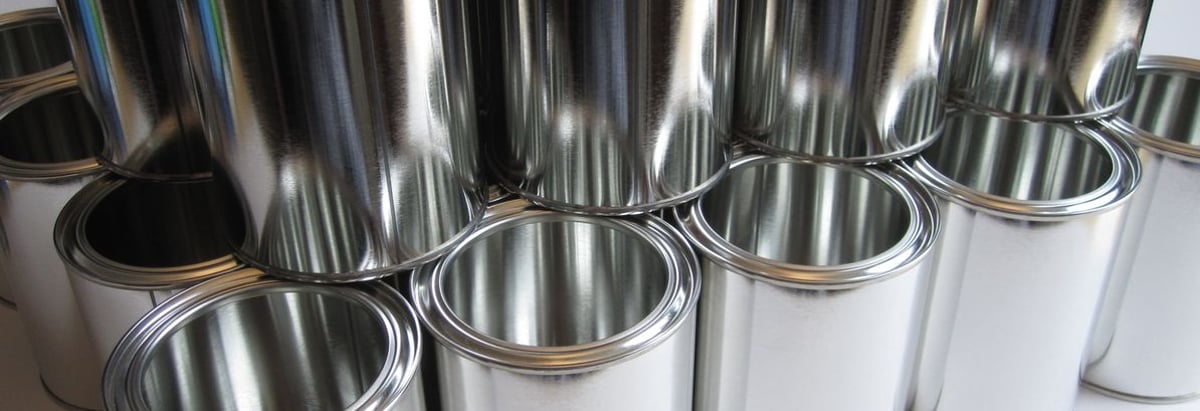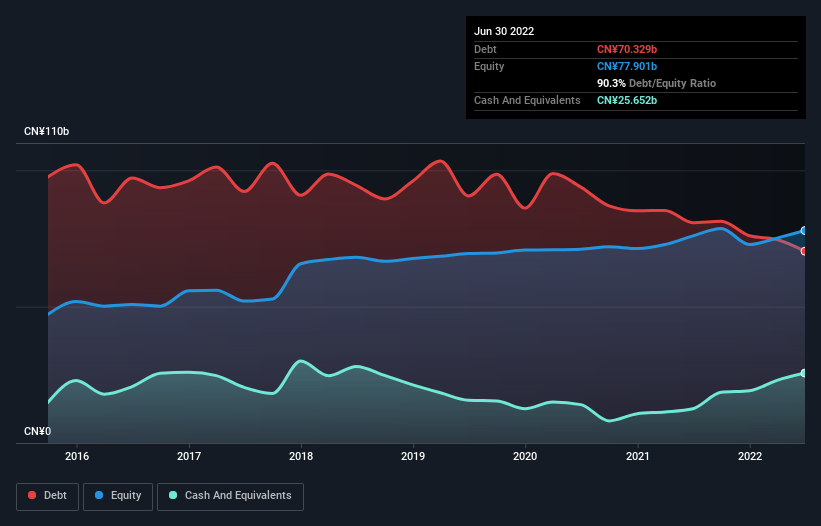- Hong Kong
- /
- Metals and Mining
- /
- SEHK:2600
Here's Why Aluminum Corporation of China (HKG:2600) Can Manage Its Debt Responsibly

Warren Buffett famously said, 'Volatility is far from synonymous with risk.' When we think about how risky a company is, we always like to look at its use of debt, since debt overload can lead to ruin. As with many other companies Aluminum Corporation of China Limited (HKG:2600) makes use of debt. But should shareholders be worried about its use of debt?
When Is Debt Dangerous?
Debt is a tool to help businesses grow, but if a business is incapable of paying off its lenders, then it exists at their mercy. Part and parcel of capitalism is the process of 'creative destruction' where failed businesses are mercilessly liquidated by their bankers. However, a more usual (but still expensive) situation is where a company must dilute shareholders at a cheap share price simply to get debt under control. Of course, the upside of debt is that it often represents cheap capital, especially when it replaces dilution in a company with the ability to reinvest at high rates of return. The first step when considering a company's debt levels is to consider its cash and debt together.
View our latest analysis for Aluminum Corporation of China
How Much Debt Does Aluminum Corporation of China Carry?
As you can see below, Aluminum Corporation of China had CN¥70.3b of debt at June 2022, down from CN¥80.8b a year prior. However, it also had CN¥25.7b in cash, and so its net debt is CN¥44.7b.

How Strong Is Aluminum Corporation of China's Balance Sheet?
We can see from the most recent balance sheet that Aluminum Corporation of China had liabilities of CN¥53.9b falling due within a year, and liabilities of CN¥63.0b due beyond that. Offsetting these obligations, it had cash of CN¥25.7b as well as receivables valued at CN¥8.88b due within 12 months. So it has liabilities totalling CN¥82.4b more than its cash and near-term receivables, combined.
Given this deficit is actually higher than the company's massive market capitalization of CN¥69.0b, we think shareholders really should watch Aluminum Corporation of China's debt levels, like a parent watching their child ride a bike for the first time. Hypothetically, extremely heavy dilution would be required if the company were forced to pay down its liabilities by raising capital at the current share price.
We measure a company's debt load relative to its earnings power by looking at its net debt divided by its earnings before interest, tax, depreciation, and amortization (EBITDA) and by calculating how easily its earnings before interest and tax (EBIT) cover its interest expense (interest cover). Thus we consider debt relative to earnings both with and without depreciation and amortization expenses.
Aluminum Corporation of China's net debt is sitting at a very reasonable 1.6 times its EBITDA, while its EBIT covered its interest expense just 6.6 times last year. While that doesn't worry us too much, it does suggest the interest payments are somewhat of a burden. On top of that, Aluminum Corporation of China grew its EBIT by 48% over the last twelve months, and that growth will make it easier to handle its debt. There's no doubt that we learn most about debt from the balance sheet. But ultimately the future profitability of the business will decide if Aluminum Corporation of China can strengthen its balance sheet over time. So if you want to see what the professionals think, you might find this free report on analyst profit forecasts to be interesting.
Finally, a business needs free cash flow to pay off debt; accounting profits just don't cut it. So it's worth checking how much of that EBIT is backed by free cash flow. Happily for any shareholders, Aluminum Corporation of China actually produced more free cash flow than EBIT over the last three years. That sort of strong cash conversion gets us as excited as the crowd when the beat drops at a Daft Punk concert.
Our View
Both Aluminum Corporation of China's ability to to convert EBIT to free cash flow and its EBIT growth rate gave us comfort that it can handle its debt. In contrast, our confidence was undermined by its apparent struggle to handle its total liabilities. Considering this range of data points, we think Aluminum Corporation of China is in a good position to manage its debt levels. But a word of caution: we think debt levels are high enough to justify ongoing monitoring. There's no doubt that we learn most about debt from the balance sheet. However, not all investment risk resides within the balance sheet - far from it. For example - Aluminum Corporation of China has 2 warning signs we think you should be aware of.
If, after all that, you're more interested in a fast growing company with a rock-solid balance sheet, then check out our list of net cash growth stocks without delay.
If you're looking to trade Aluminum Corporation of China, open an account with the lowest-cost platform trusted by professionals, Interactive Brokers.
With clients in over 200 countries and territories, and access to 160 markets, IBKR lets you trade stocks, options, futures, forex, bonds and funds from a single integrated account.
Enjoy no hidden fees, no account minimums, and FX conversion rates as low as 0.03%, far better than what most brokers offer.
Sponsored ContentNew: Manage All Your Stock Portfolios in One Place
We've created the ultimate portfolio companion for stock investors, and it's free.
• Connect an unlimited number of Portfolios and see your total in one currency
• Be alerted to new Warning Signs or Risks via email or mobile
• Track the Fair Value of your stocks
Have feedback on this article? Concerned about the content? Get in touch with us directly. Alternatively, email editorial-team (at) simplywallst.com.
This article by Simply Wall St is general in nature. We provide commentary based on historical data and analyst forecasts only using an unbiased methodology and our articles are not intended to be financial advice. It does not constitute a recommendation to buy or sell any stock, and does not take account of your objectives, or your financial situation. We aim to bring you long-term focused analysis driven by fundamental data. Note that our analysis may not factor in the latest price-sensitive company announcements or qualitative material. Simply Wall St has no position in any stocks mentioned.
About SEHK:2600
Aluminum Corporation of China
Primarily engages in the exploration and mining of bauxite, coal, and other resources in the People's Republic of China and internationally.
Flawless balance sheet and undervalued.
Similar Companies
Market Insights
Community Narratives



